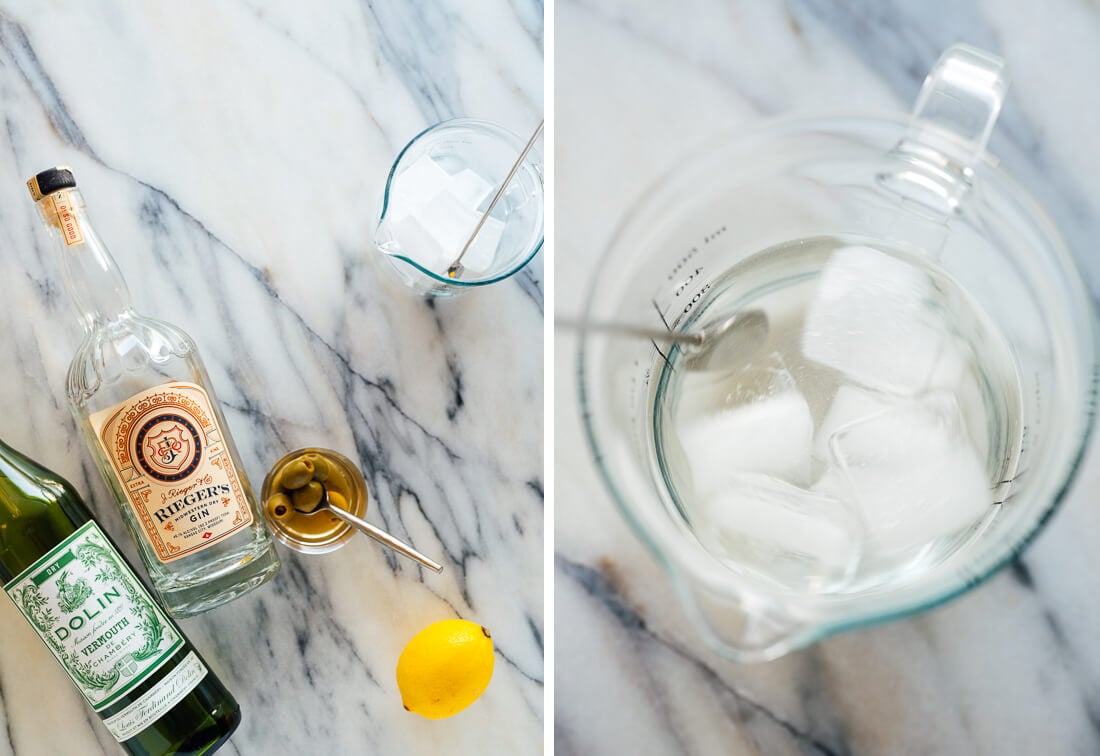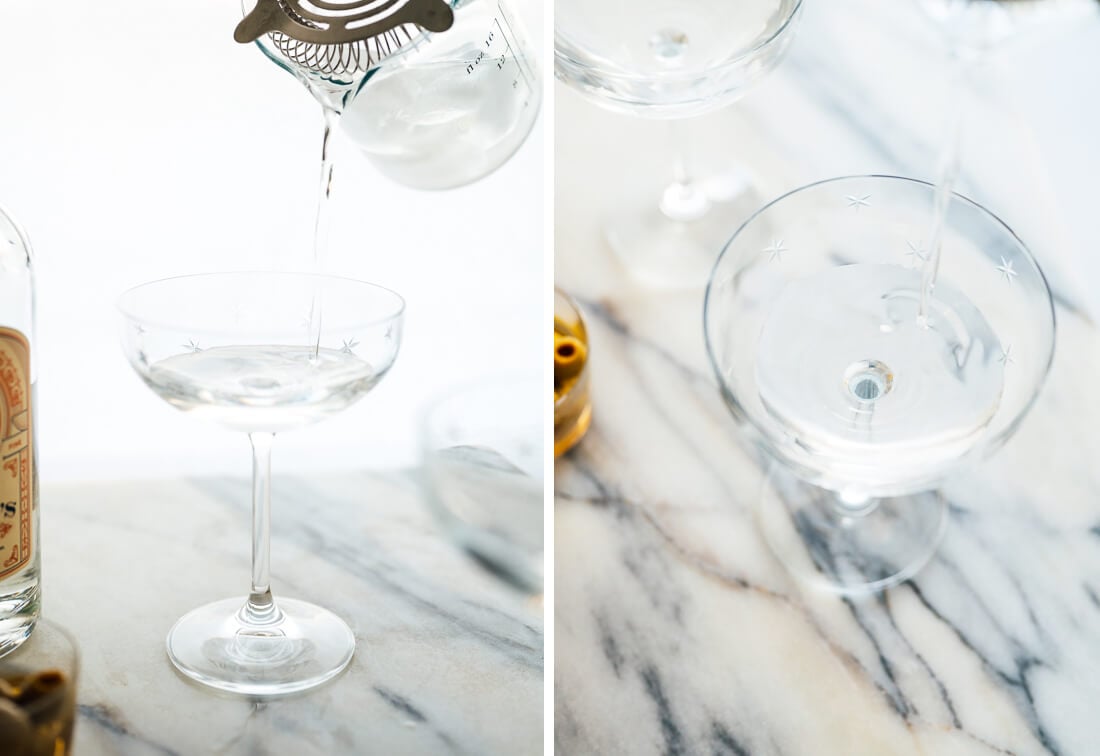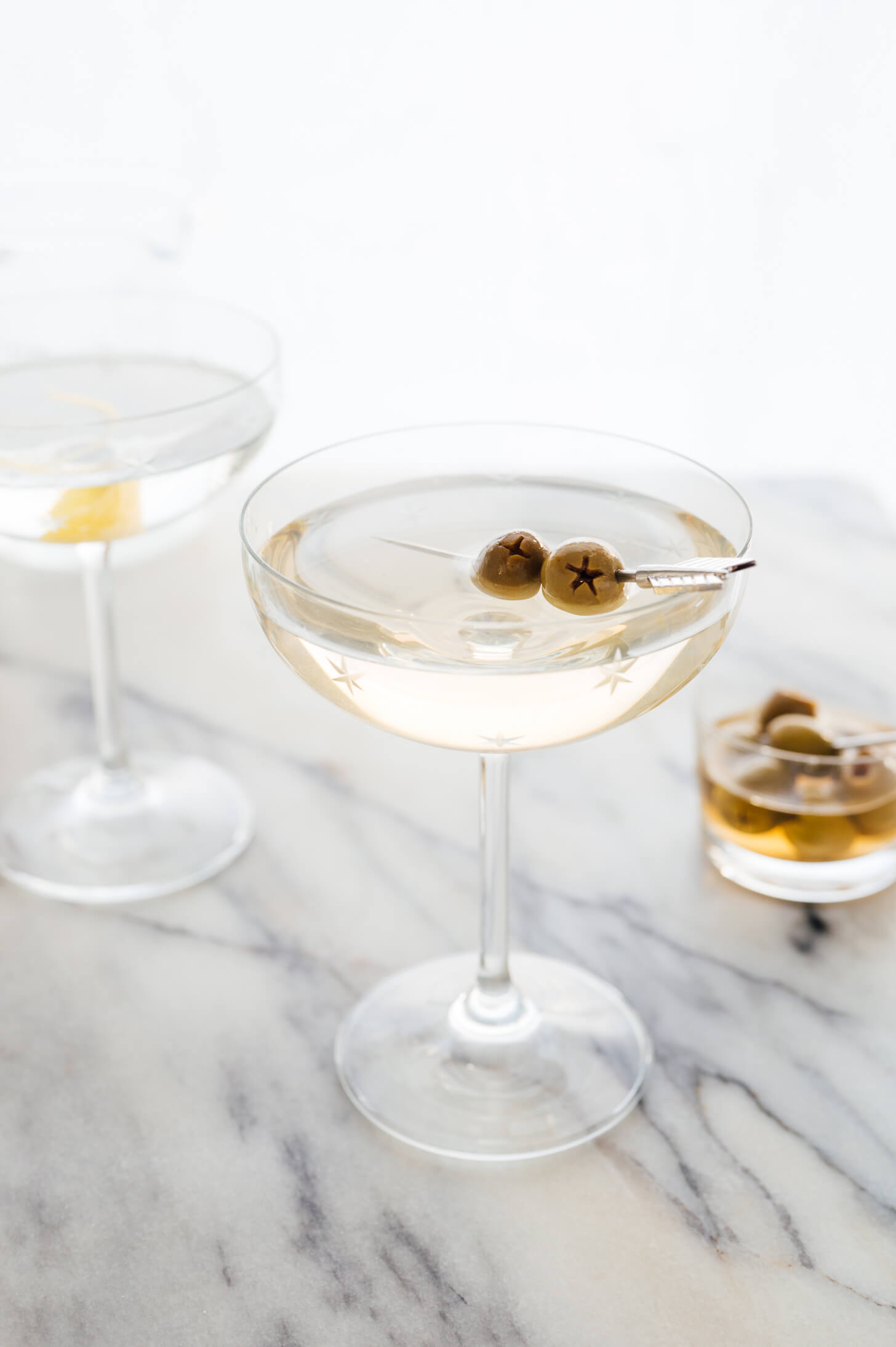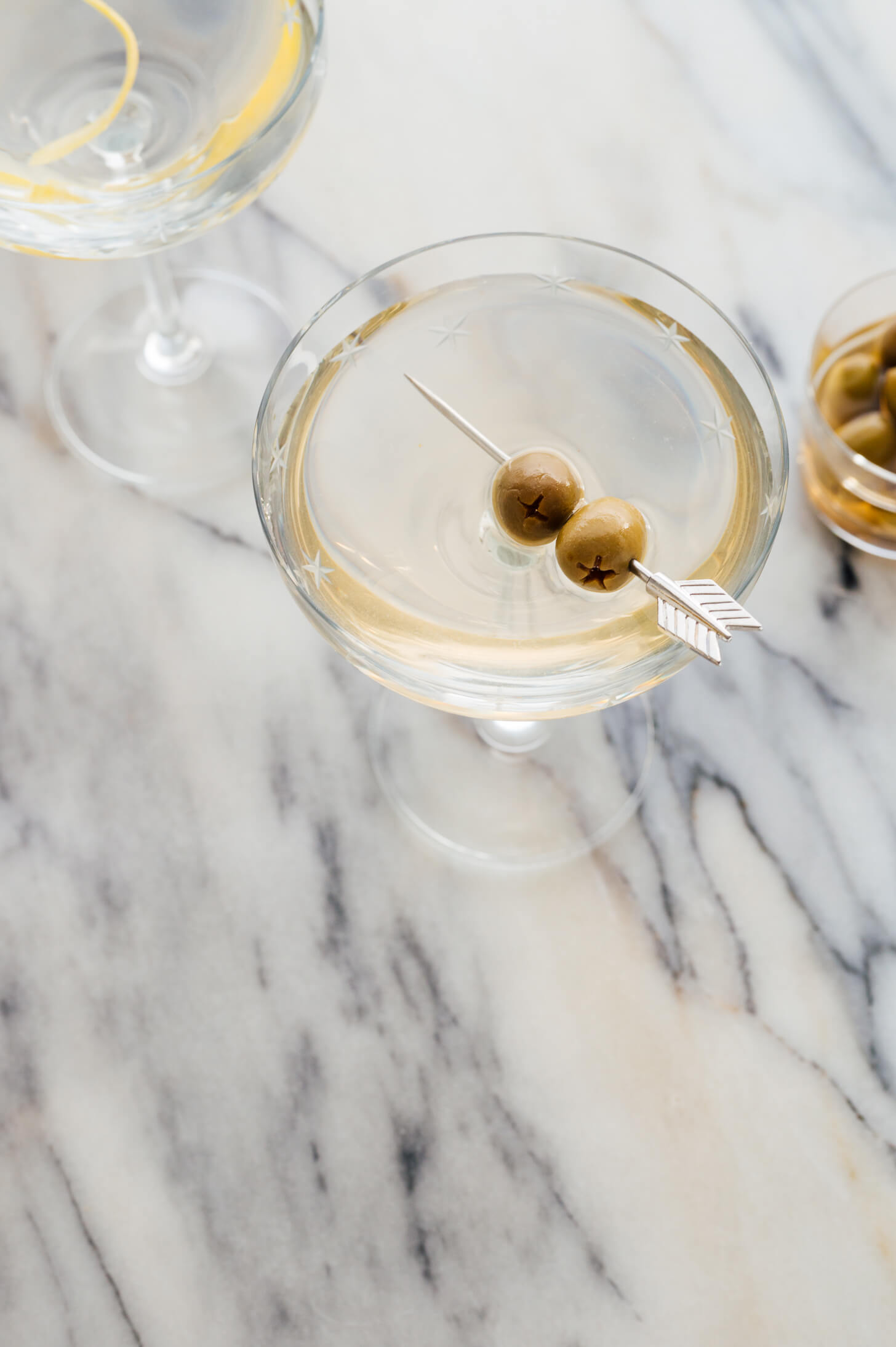How about a martini? Sometimes a martini sounds just right. I’m often disappointed by restaurant martinis (unless I’m at The Campground in Kansas City—Chris makes the best martini of all time).
So, I’ve been studying the martini and perfecting my at-home martini game. Today, I’m sharing what I’ve learned!

While martinis may seem intimidating, they are actually the perfect cocktail to make at home. The ingredient list is short and basic. The method is easy—stirred, not shaken, to bring out gin’s best flavors.
Now then, the “perfect” martini is very much determined by your personal preferences. I’ve typed up a foolproof classic martini recipe below. I’ve also provided suggested ingredients and details to help craft your perfect martini.
Whether you like your martini with gin or vodka, wet or dry, with a lemon twist or dirty with olives, this recipe is for you.

Martini Ingredients
You’ll need just a few ingredients to make a martini at home:
Gin
A true martini is made with gin. London dry gin is traditional and offers a balanced blend of juniper and botanicals. Beefeater’s gin is a prime example and an excellent choice, whether you’re serving your martini with a twist or making it dirty.
Gin forms the backbone of martini flavor, so your choice of gin is key. Choose the gin that suits you best. Hendrick’s is an unconventional gin with light cucumber flavor that would be lovely in a martini served with a lemon twist.
…or vodka
While gin is classic, you might prefer vodka. I get it. Sometimes I’m more in the mood for a vodka martini. Vodka is less complex than gin so it yields a simpler drink. Any high quality vodka will do, such as Tito’s or Grey Goose.
Dry vermouth
It’s easy to think of a martini as a glass of straight liquor, but vermouth is absolutely key. Dry vermouth is clear or very pale yellow in color, so it blends in visually with the rest, but offers complex botanical flavors that you might describe as citrusy, herbaceous or floral. Dolin dry vermouth is light and citrusy and just right for martinis, in my opinion.
Compared to sweet vermouth, which is red, dry vermouth is made without any added sugar—hence the term dry. Perhaps confusingly, a “dry martini” is made with less dry vermouth than usual.
Tip: Vermouth will keep well in the fridge for up to three months. If you find yourself with extra, you might enjoy it over the rocks or mixed with sparkling water for a spritz.
Garnishes
Now then, are you serving your martini with a twist or green olives? There’s no wrong answer, but you must choose one of the two. Unless you’re making a dirty martini (option provided within the recipe), in which case olives are the definite choice.
Tip: If you’re opting for a twist, try to twist your lemon peel directly over the drink before dropping it in. Twisting it releases some of the oils, which will impart extra flavor to your drink.
Don’t forget the ice
No matter how you like your martini, we surely agree that we want it ice cold. Some prefer their martini on the rocks, but I always opt to serve martinis up in a martini glass. That way, they don’t get too watered down over time.
Even then, we’ll fill our cocktail glass with ice and water to chill it before serving, and we’ll also use plenty of ice (and plenty of stirring) while mixing the martini. Once the martini is properly chilled and lightly diluted by the ice, strain it into the chilled glass and savor it.
Watch How to Make a Martini

Martini Gin to Vermouth Ratios
The ratio of liquor to vermouth has a big impact on the final flavor of your martini, and you can tweak the ratio to suit your preferences. When you’re mixing, consider that liquor offers a strong bite of alcohol (typically 40% alcohol), and vermouth is about half that (Dolin dry is 18% alcohol).
Classic
2:1 ratio. The classic ratio is entirely up for debate, but two parts gin and one part vermouth seems perfectly balanced to my palate.
Dry
4:1 ratio. Dry martinis contain less vermouth than “classic” martinis, and again the ratio is debatable (anywhere from 3:1 to 9:1).
Fifty-Fifty
1:1 ratio. Equal parts gin and vermouth yield the the most mellow sipper of the bunch.
Upside-Down
1:5 ratio. Julia Childs liked her martinis upside-down (otherwise known as reverse or wet martinis). She preferred much more vermouth, specifically Noilly Prat vermouth, to gin.
James Bond-Style
This one is interesting! “Three measures of Gordon’s [gin]; one of vodka; half a measure of Kina Lillet. Shake it over ice, and add a thin slice of lemon peel.”
More Classic Cocktails to Make at Home
Here are a few of my favorite well-known cocktails. You’ll find plenty more, including fun seasonal options, in my cocktail archives.
Please let me know how your martini turns out in the comments! I love hearing from you. Cheers!

Martini
- Author: Cookie and Kate
- Prep Time: 5 minutes
- Total Time: 5 minutes
- Yield: 1 cocktail 1x
- Category: Cocktail
- Method: Stirred
- Cuisine: American
- Diet: Vegan
Make a classic martini at home with this foolproof recipe. Whether you like your martini with a twist of lemon or dirty with olives, this recipe is for you. Yields 1 cocktail as written; you can mix several at once if you’d like.
Scale
Ingredients
- 2 ounces gin or vodka
- 1 ounce dry vermouth
- For a dirty martini: 1 to 3 teaspoons olive brine
- Garnish: Strip of lemon peel (for a twist) or 2 cocktail olives
Instructions
- Chill your martini glass by filling it to the brim with ice and water. Set it aside while you prepare the cocktail.
- Next, fill a mixing glass with ice. Pour in the gin and vermouth. If you’d like a dirty martini, start with 1 teaspoon olive brine.
- Use a mixing spoon to stir the mixture in a circular motion until it’s ice cold, about 30 seconds (which will seem like a long time, but it’s worth it). If you’re making a dirty martini, taste and add more brine by the teaspoon if desired.
- Discard the ice and water in your martini glass. Strain the cold martini mixture into the cold glass. Garnish with a lemon twist or olives. Enjoy!
Notes
To make a dry martini: Decrease the amount of vermouth. Try ½ ounce for a balanced but dry cocktail.
Suggested ingredients: London-style gin, such as Beefeater’s, yields the most classic martini. For the vermouth, Dolin dry is excellent. Gin is the traditional choice, but you can use vodka if preferred—try Tito’s or Grey Goose.
Measurement tips: Two ounces is ¼ cup. One ounce is 2 tablespoons. I like to use this stainless steel jigger (affiliate link) for measuring small amounts of liquid.
▸ Nutrition Information
Did you make this recipe?

